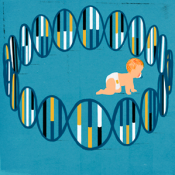Imagine you could select your future child based on likely intelligence. Would you?
By Philip Ball,
Prospect
| 03. 06. 2023
Imagine you’re planning to have a baby and are told there’s a method that can select the embryo to increase, by 2 per cent, the chance of them getting into a top school. Would you use it? A new survey found that more than four in 10 Americans say they would. This study of attitudes towards a technique called preimplantation genetic testing for polygenic risk (PGT-P) shows that there could be a substantial market for it if it is made available for such applications. The technology would not, say bioethicist Michelle N Meyer of Geisinger Health System in Danville, Pennsylvania, and her co-authors, just be adopted by a few “idiosyncratic individuals”, as has sometimes been suggested previously.
Of course, if you’re sensible then you will ask about the small print. How much does the process cost? Is it risky? Since it requires IVF, so that the prospective embryos can be genetically tested before implantation, would you opt for that even if it would not otherwise be necessary to conceive? But the researchers intentionally set a low bar for the 6,823...
Related Articles
By Diaa Hadid and Shweta Desai, NPR | 01.29.2026
MUMBRA, India — The afternoon sun shines on the woman in a commuter-town café, highlighting her almond-shaped eyes and pale skin, a look often sought after by couples who need an egg to have a baby.
"I have good eggs,"...
By Steve Rose, The Guardian | 01.28.2026
Ed Zitron, EZPR.com; Experience Summit stage;
Web Summit 2024 via Wikipedia Commons licensed under CC by 2.0
If some time in an entirely possible future they come to make a movie about “how the AI bubble burst”, Ed Zitron will...
By Arthur Lazarus, MedPage Today | 01.23.2026
A growing body of contemporary research and reporting exposes how old ideas can find new life when repurposed within modern systems of medicine, technology, and public policy. Over the last decade, several trends have converged:
- The rise of polygenic scoring...
By Daphne O. Martschenko and Julia E. H. Brown, Hastings Bioethics Forum | 01.14.2026
There is growing concern that falling fertility rates will lead to economic and demographic catastrophe. The social and political movement known as pronatalism looks to combat depopulation by encouraging people to have as many children as possible. But not just...




